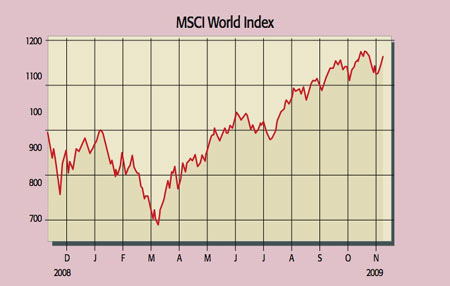Get the latest financial news, insights and expert analysis from our award-winning MoneyWeek team, to help you understand what really matters when it comes to your finances.
You are now subscribed
Your newsletter sign-up was successful
Want to add more newsletters?

Twice daily
MoneyWeek
Get the latest financial news, insights and expert analysis from our award-winning MoneyWeek team, to help you understand what really matters when it comes to your finances.

Four times a week
Look After My Bills
Sign up to our free money-saving newsletter, filled with the latest news and expert advice to help you find the best tips and deals for managing your bills. Start saving today!
Markets are displaying a "complete disregard for reality", says Rana Foroohar in Newsweek. Just about everything has rocketed since this year's rally began. The MSCI World Index is up 68%, while emerging markets have almost doubled. And crude oil has gained 132% from its lows.
So watch out: valuations are looking "stretched", says Capital Economics. The cyclically adjusted S&P 500 p/e ratio (which uses an average of the last ten years' earnings to smooth out the effect of the profit cycle) is at 20. The long-term average is just below 15.
Yet the fundamentals are lousy, as Foroohar notes. Oil inventories are rising and profits are being bolstered by unsustainable cost-cutting. At the same time, "consumer credit has all but dried up in the developed world" and consumers in the world's biggest economy have started paying down their debts.
MoneyWeek
Subscribe to MoneyWeek today and get your first six magazine issues absolutely FREE

Sign up to Money Morning
Don't miss the latest investment and personal finances news, market analysis, plus money-saving tips with our free twice-daily newsletter
Don't miss the latest investment and personal finances news, market analysis, plus money-saving tips with our free twice-daily newsletter
So we should expect "seven lean years" as we gradually work off the excesses of the credit bubble, says Jeremy Grantham of GMO. Yet markets are still looking forward to a quick return to the pre-crunch economy. In short, we're "seeing a new bubble" develop, says Robert Shiller of Yale University.

That's because the liquidity created by the world's central banks through rock-bottom interest rates and quantitative easing is heading into asset markets. The weak dollar plays a key role, says Nouriel Roubini of New York University in the FT. With the Fed now likely to keep interest rates on hold for a long time, the dollar is weakening, encouraging the "mother of all carry trades". Investors borrow in low-yielding dollars, sell them, and invest the money in higher-yielding currencies or other risky assets, such as commodities or stocks juicing up returns with leverage.
At some stage, says Roubini, the dollar will bounce back and these carry trades will unravel. That will create a "stampede" back into dollars as carry traders cover short positions. The result will be a "co-ordinated collapse" of risky asset prices. But by then, there will be scant scope for stretched governments to halt the fallout, says Martin Hutchinson on Breakingviews. And that means things could get very nasty indeed.
Get the latest financial news, insights and expert analysis from our award-winning MoneyWeek team, to help you understand what really matters when it comes to your finances.
MoneyWeek is written by a team of experienced and award-winning journalists, plus expert columnists. As well as daily digital news and features, MoneyWeek also publishes a weekly magazine, covering investing and personal finance. From share tips, pensions, gold to practical investment tips - we provide a round-up to help you make money and keep it.
-
 Can mining stocks deliver golden gains?
Can mining stocks deliver golden gains?With gold and silver prices having outperformed the stock markets last year, mining stocks can be an effective, if volatile, means of gaining exposure
-
 8 ways the ‘sandwich generation’ can protect wealth
8 ways the ‘sandwich generation’ can protect wealthPeople squeezed between caring for ageing parents and adult children or younger grandchildren – known as the ‘sandwich generation’ – are at risk of neglecting their own financial planning. Here’s how to protect yourself and your loved ones’ wealth.

